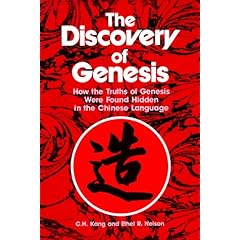I was told that Chinese is the oldest written language and that many of their words are based on Bible stories, specifically from Genesis.
If you stop and think about it a minute, it will be obvious that if Chinese is the oldest written language, it's not likely to come from Hebrew, and that the age of Chinese writing would be irrelevant to any loan-words that might have come from Hebrew.
It's hard to say what the oldest written language actually is. We know that people were writing in India and Mesopotamia and Egypt more than 5000 years ago; we don't have such clear evidence of the beginnings of Chinese writing.
This is suppose to be evidence that long before Buddhism and Taoism the Chinese people believed in the same god that Christians now believe in.
I've never heard this before.
With good reason. It's a fantasy. At the time Siddhartha Gautama lived, Christianity (and the Christian concept of a Triune God) didn't exist, Jewish monotheism was still developing. Any "Judaism" that had been exported to China and had time to establish itself among the Chinese would have been a Levantine polytheism, monolatrous or not, and wouldn't have had much in common with the Christian god.
Does anyone here know anything about it? And what are your thoughts?
It's hard to comment, because I'm not sure what the person you're talking to is claiming.
As far as anybody knows, Christianity and Judaism both first arrived in China in the 7th century CE. There are unsubstantiated legends that one or more of the apostles journeyed to China, but no actual evidence.
If your friend is claiming that some Chinese words are similar to Hebrew words, and that that's evidence that the ancient Chinese and the ancient Hebrews worshiped the same god, you can bet that your friend is suffering from a profound misunderstanding of linguistics
and the history of religion in China
and the history of religion in the Levant. Without knowing more details, it's impossible to say just what misunderstandings those are.
But ask yourself: If there were a universal god who revealed himself to both the Chinese and the Hebrews, why would the Chinese speak and write about him using Hebrew words?


